Celebrating organic conversion
Making good food accessible for all Woodoaks Farm
Out to Lunch
Our secret diners return
Taking Sustainable Food Places to Westminster




Celebrating organic conversion
Making good food accessible for all Woodoaks Farm
Out to Lunch
Our secret diners return
Taking Sustainable Food Places to Westminster



As we move into the new year, it’s the perfect time to reflect on the achievements of 2024. Last year was a remarkable one for the Soil Association, leading the growing movement for healthy soils, thriving ecosystems, and nature-friendly farming across the UK. We’ve listed just a few 2024 successes on page 4, including World Soil Day, our campaign to save UK fruit and veg growing, and progress in our campaign against ultra-processed foods.
As ever, none of this progress would have been possible without you, our members and supporters. Your unwavering commitment, generosity, and belief in a better future have been the driving force behind everything we’ve achieved together.
Also, in this issue we share an update on our Out to Lunch campaign, challenging secret diners to find out what food is on offer for children at popular high street restaurant chains. Thanks to the collective efforts of parents, families, and supporters like you, we’ve seen some real change. Over the years, Out to Lunch has resulted in many improvements to the state of children’s food offerings including seeing more veg served and less sugar-fuelled pudding options.
You’ll also find our members survey included with this magazine. We’d love to hear from as many of you as possible, so please do take five minutes to complete this. Your feedback is important to help us shape the future of our work and communications to you.
I hope you enjoy this edition of Living Earth. As ever, please do get in touch with us with any comments or queries; we love hearing from you.

Ray Clark, Head of Membership
We’d like to say a big thank you to you, our members, for your continued support. Together we’re making a real difference to the future of nature, food and farming.


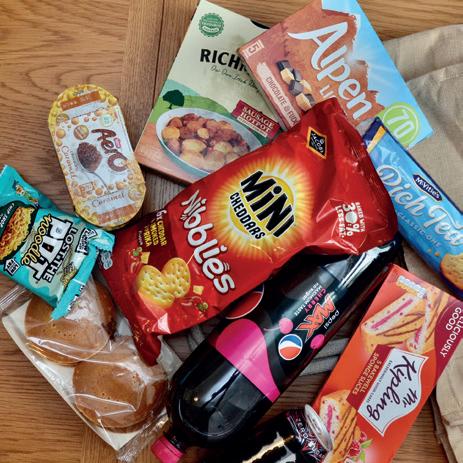
World Soil Day was December 5th and we celebrated by encouraging people to go outside and get dirty for climate and nature. You also answered our appeal to save our soil and helped us achieve our Big Give target to unlock matched funding and double your donations. With your support, we’re working with farmers to help them adopt soil friendly farming methods that nurture and transform soil quality.
We have received over 20,000 signatures on our call to support UK growers in creating a sustainable future for our fruit and veg. In December 2024, we went to Westminster to be part of the A Taste of Agroecology event. We have asked the government to take urgent action to increase UK fruit and veg production, and your support formed part of our evidence. Thank you to everyone who signed our petition – we’ll keep you updated on our progress!
The Food, Diet, and Obesity Committee of the House of Lords published a report in October looking at ultra-processed foods (UPFs). UPFs make up a shocking 65% of UK children’s diets so we’re happy to see several of the Soil Association’s headline recommendations have been adopted by the committee. We will continue to call for improved access to healthy and sustainable food for all.

Make a donation:
To everyone who has supported us, we can’t thank you enough
As a charity, we rely on generous donations to continue helping nature. Would you like to support our work today? Visit www.soilassociation.org/donation.
Increase your monthly gift to the Soil Association:
Members like yourself are the lifeblood of the Soil Association. Your support means a lot, and even a small increase in your monthly gift to us will go a long way to amplifying our impact on our planet.
Gift Aid:
Please keep us up to date with whether we can claim gift aid on your donations. By opting in to gift aid, it allows us to claim an extra 25p from HMRC for every £1 donated by you. If you are a UK taxpayer, you could help your donation go further by allowing us to claim gift aid. The minimum requirement is that you’ve paid the basic rate of tax. Do give us a call if you’re not sure and we can talk you through it.
If you’re interested in making an even bigger impact, please do phone us on 0300 330 0022 or pop us an email at memb@soilassociation.org
Our Out to Lunch campaign is back, and the results are eye-opening! Despite growing concerns from parents about ultra-processed food (UPF), kids’ menus across the UK are lacking in healthy, freshly prepared options.
We sent an army of undercover ‘secret diners’ to 20 of the UK’s most popular restaurant chains to evaluate the food on offer. These restaurants were scored across several key areas: familyfriendliness, healthy options, fresh preparation, value for money, sustainability, and ingredient provenance.
The results
The findings are concerning. We discovered an abundance of unhealthy options, excessively sugary desserts, problematic additives, and ultra-processed meat. Fresh, on-site preparation is rare, with many restaurants serving pre-made meals instead of cooking from scratch.
But it’s not all bad news – some chains prove that healthy, fresh food is both possible and affordable. Eating at league table winner Wahaca only costs 25p more than Franco Manca at the bottom of the league table, and
At least 40% of protein options (meat, fish, and plant-based) reviewed across these menus were found to be ultra-processed.
their kids’ meals are cheaper on average than Pizza Express and Pizza Hut, which are in the bottom five. JD Wetherspoon is one of the cheapest chains and came in at number two in the league table, serving two portions of veg with all children’s meals and fruit options for pudding.
Soil Association Senior Policy Officer Oona Buttafoco said:
Families want and deserve better. They’ve told us that fresh, healthy, and delicious choices are their top priority when eating out with kids. While we understand the cost pressures and other challenges facing restaurant chains, it’s concerning when some are misleading parents by serving ready-made meals that are far from what families expect. Ultra-processed food is already dominating British children’s diets, and we urgently need to change that. It’s not all bad news though: several chains are leading the way, offering freshly prepared, responsibly sourced meals with transparent ingredient sourcing – all at a reasonable price.
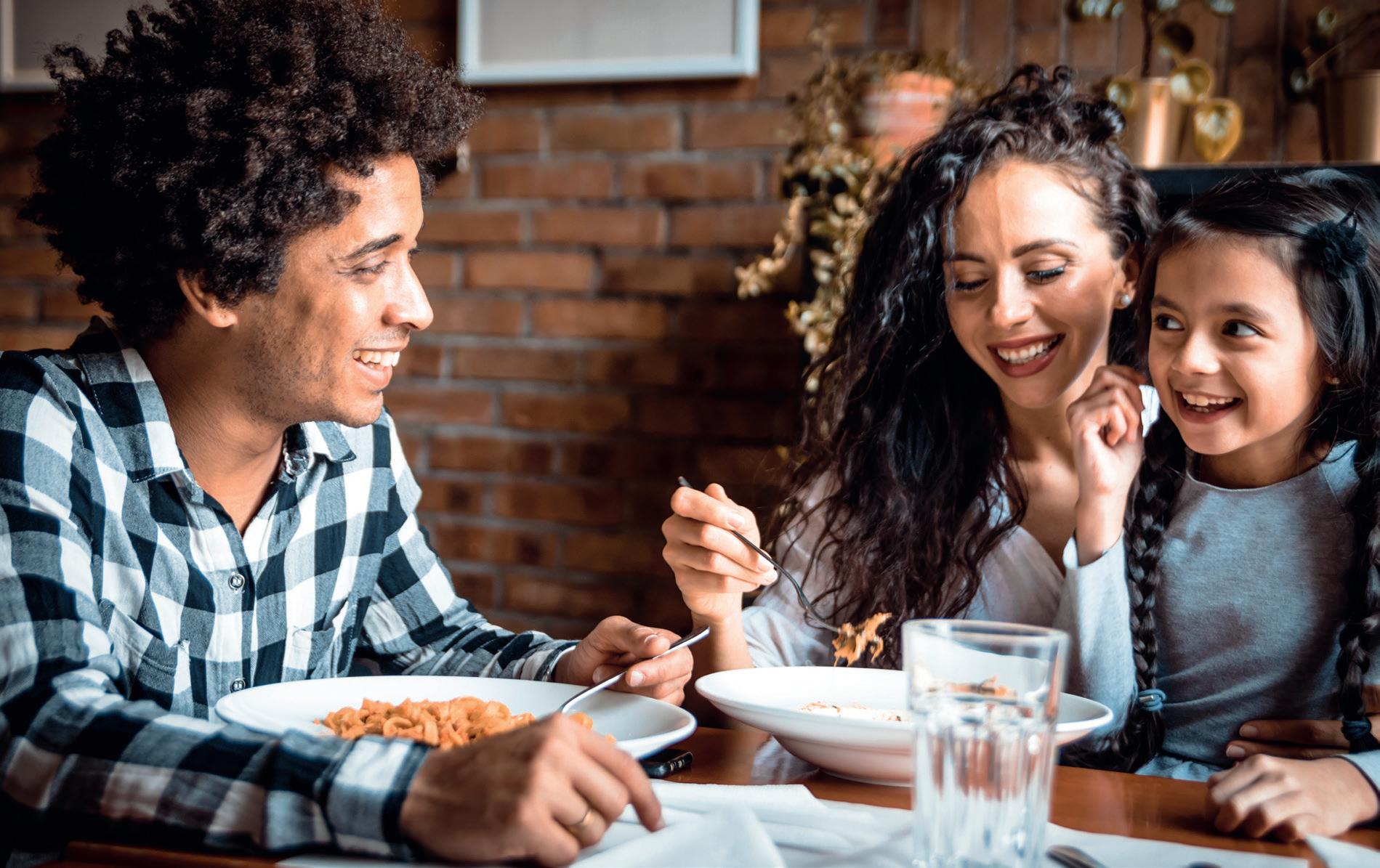
Our progress so far
Thanks to the collective efforts of parents, families, and supporters like you, we’ve seen some real change.
In 2024, several pioneering restaurant chains – Wahaca, JD Wetherspoon, Zizzi, Carluccio’s, Toby Carvery, Harvester, and Leon – committed to reporting on the use of ultra-processed ingredients for the first time.
Since launching the Out to Lunch campaign in 2013, we’ve sparked significant improvements in high street restaurant chains, including:
• More vegetables now feature on kids’ menus: millions more portions of veg are being served because of the combined impact of the campaign.
• There has been a huge increase in vegetarian and vegan options: reflecting the growing demand for meat-free options.
• Over a third of chains now have organic ingredients or items on the menu.
• Ten out of twenty restaurants signed the ‘Stop Deforestation Pledge’, with a goal to make their supply chains better for the planet.
• Restaurants are tackling sugar levels in kids’ desserts: Several chains are now actively addressing excessive sugar content.

One of our organic calendula fields
Some of our organic pr oducts
CHOOSE FROM OVER 80 PRODUCTS IN THE LARGEST RANGE OF ORGANIC SUPPLEMENTS
All e thic ally source d and Soil Asso cia tion cer tifie d.
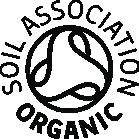
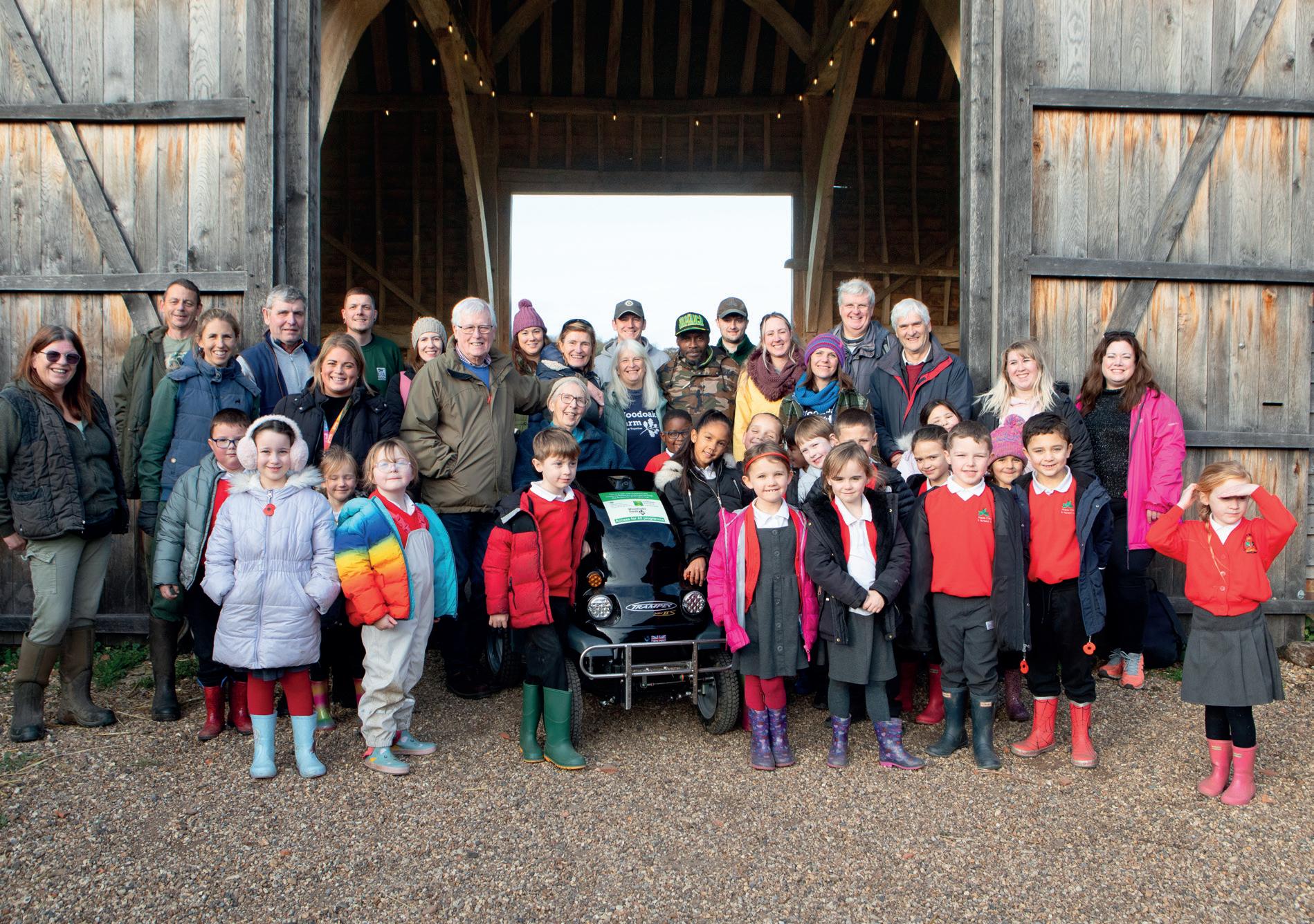
Woodoaks has had another exciting year making progress on its organic goals. Catch up on some of the highlights from the Maple Cross site with our ‘Postcards from Woodoaks’.
BBC
In December, the team from Countryfile visited to host the hit BBC One show. After 3 days of filming, John Craven and Margherita Taylor explored everything from the farm’s rural heritage to the ongoing work with schools and volunteers reconnecting with where their food comes from.
For the history buffs, a particular highlight was the diary of Victorian farmer, John White. Following an exhibition by the Three Rivers Museum and The University of Hertfordshire, the diaries have been brought to life to illuminate the world of 19th century farming, with over 50 years of insights into Woodoaks and the surrounding landscape and people.

Volunteers are at the heart of everything Woodoaks achieves and to date, the team have helped to plant a total of 2.5km of hedgerows as part of the farm’s regeneration plans. These hedgerows will help to create habitats and cover for a wide range of wildlife and improve the biodiversity of the farm.
Compost Club has also been a volunteer hit. Every Friday, Woodoak’s compost champions help to create and maintain the compost used throughout the farm. They’re even able to share the spoils with the local community. Thank you to Flo Garvey for all her hard work bringing this to life!


When Woodoaks was donated to the Soil Association Land Trust in 2020, our mission was to ensure that it became a sustainable source of nutritious food, a haven for wildlife, and a place for learning, community connection and wellbeing. As part of this plan, the team have been working to convert the farm to organic and in 2024, they became a Soil Association Certified Organic Farm.
This, coupled with the regeneration work by volunteers has helped to create an agroforestry system. This means the
Land Trust’s tenant farmer will grow organic crops or pasture around rows of trees as a method of boosting soil health, reducing carbon emissions, and creating habitats for wildlife.
The hard work is already being rewarded as species return to the farm. A pair of little owls have moved into one of the nest boxes and everyone on site has been following their journey via nest box cameras. You can see frequent updates on the birds and wildlife at Woodoaks on their social media accounts.

We have shifted to practices that allow us to farm in harmony with nature and we are now producing more food directly for the local community, who we have brought back onto the farm as customers, pupils and volunteers
Woodoaks Manager Rose Lewis


The aspirations don’t stop at organic! Woodoaks has a plan to continually improve through conservation and regeneration. If you attended our recent AGM, you would have had a sneak peek into the future of the farm.
New habitats such as ponds, trees and flower rich meadows, combined with a regenerative approach to farming and soil health, will create a wildlife friendly environment for organic food production, which respects the heritage of the farm. There are also ambitions for new circular pathways and a community orchard to help people learn about the relationship between our food production and nature.
We look forward to keeping you updated with progress on the farm and what this means for nature, climate and health.


Did you include the environment in your goals? If you’d like to create a more sustainable and organic lifestyle in 2025, we’ve put together our top tips and small swaps to help you on your journey.
Seasonal food is naturally ripe and ready for harvest in your local area at a certain time of year. Eating organic, seasonal food means we don’t have to import food from different climates around the world and helps make our diets more sustainable by reducing our carbon footprint.
Whether you grow herbs in an old container on the windowsill, or fruit and veg in your garden, growing at home is easier than you might think.
For those with limited time or space, local organic box delivery schemes offer an easy alternative. These boxes, filled with seasonal produce, eggs, meat, and more, connect you to farmers working in harmony with nature. They’re a convenient way to experiment with new ingredients while supporting ethical farming practices.
Whether you’re planting a garden or choosing an organic box, making these nature-friendly choices helps create a healthier planet for everyone.
With conscious consumerism on the rise, more people are seeking genuine organic products. However, terms like “natural” and “organic” aren’t always regulated, making it crucial to identify greenwashing, which is when brands claim to be eco-friendly without truly meeting those standards.
To shop smarter, look for trusted certifications like the COSMOS or Soil Association logos on beauty products and the GOTS or Soil Association logos on textiles. These symbols guarantee that products meet high environmental and ethical standards, avoiding harmful chemicals, genetically modified ingredients, and animal testing.
Sustainable shopping extends beyond new purchases. Explore charity shops for unique second-hand finds and consider upcycling older items into something new, like turning jeans into a bag or towels into reusable face cloths.
When buying new, opt for organic alternatives, such as cotton muslins or pads instead of conventional cotton wool or face wipes. Most importantly, use what you already own and replace thoughtfully to minimize waste. Sustainable shopping is about making mindful choices that benefit the planet while embracing creativity and individuality.
There’s a temptation for gardens to be ‘neatened up’ in the winter ready for spring but this can be problematic for much of our wildlife. Try an untidy garden this winter by leaving soil undisturbed, leaves to mulch and areas of twigs, sticks and stems to pile up. You’ll be helping everything from insects and spiders to slow worms and toads by providing shelter and hibernation sites. Undisturbed soil will also protect the fungal networks and allow the soil to feed off the decaying roots of plants.
You could take it one step further and cover beds with a generous layer of mulch or plan your cover crops for next autumn. These will help protect the soil and improve the nutrients available in the spring. Winter is also a great time to start your no-dig gardening journey – convert your system with cardboard and a thick layer of compost and after planting, make sure to mulch around your plants.
In this issue of Living Earth, we are excited to hear from Alison Bond, Research Officer at the Soil Association. Alison is passionate about animal welfare and works to help keep the Soil Association at the forefront of the drive to provide animals with a Good Life.
In this article, we chat to Alison about how the Soil Association ensures its organic farms are always striving for better welfare.
Hi Alison, thanks for chatting to us today. To start, could you tell us a bit about yourself and how you came to be at the Soil Association?
I’ve always been interested in the environment and cared about where our food comes from. Animal welfare has been a big focus in my career as my PhD was looking at welfare outcome assessments on pig farms. I was taking a ‘farm to fork’ approach when assessing animal welfare and through that, I began working on a joint project with Soil Association, RSPCA, and University of Bristol, called Assurewel. We were looking

to implement the research learnings and embed welfare assessments into the inspections of the certification schemes. I’ve moved about a bit but I’m back now working on another of Soil Association’s welfare projects as part of the Ocado Farm to Fork partnership.
And what do you do as a research officer at the Soil Association?
There’s a lot of people focused on animal welfare, ranging from those doing the inspections to people creating the certification criteria. I focus on ensuring our evidence base is up to date and applying welfare research into our work at the Soil Association.

At the moment, I’m looking at the Good Life Frameworks which are a set of measures that observe if an animal has access to positive experiences that provide a ‘good life’ rather than just measuring a lack of negative experiences. Working with other researchers, we are taking the latest welfare research and updating these frameworks for our organic farmers to make sure we’re always striving for the best welfare opportunities possible.
So, what do these updates look like and what are the steps to getting them out there?
Currently, the frameworks look at the freedoms, opportunities and choices farmed animals have in their environment to express their natural behaviours, in addition to achieving good health and welfare outcomes. This includes things like variation in their diets, the freedom to explore their environment and ability to choose where they’d like to be and how they’d like to interact with others. Everything falls into one of five categories – Comfort, Pleasure, Interest, Confidence and Health. The Ocado partnership is looking at how we can turn these frameworks into easily measurable checklists that are meaningful for farmers and helps them to communicate the opportunities for good welfare on their farm to consumers. We want to make it really
clear throughout the supply chain what the quality of these animals’ lives looks like.
The next step is to create these farmer friendly checklists that allow farmers to review their systems and optimise the opportunities they’re offering their animals. We need to take the academic frameworks and turn them into something that can be applied in the field, whilst also creating the evidence led language needed for consumers to understand what is happening.
We’re currently looking at laying hens and dairy farms and there’s an opportunity for us to expand and look at some beef and sheep farms this year too. Each species is different, so it takes time to create the plan for their specific needs.
And finally, what do you wish people knew about animal welfare and farming?
I think it would be how many farmers truly care about their animals and how proactive they are about their welfare. Our work is based on evidence and that, in part, comes from people always caring deeply enough to push for the next step in best practice. We’re hoping that this partnership will provide the tools and language to further the conversation and highlight this to consumers.

At the Soil Association, we know that tackling food waste and promoting sustainable food choices is crucial for the health of our planet. That’s why we’ve teamed up with experts to bring impactful tools and educational activities to life, helping communities better understand the value of food and how to reduce waste.
A highlight of this work are interactive school workshops, which teach children about food’s hidden costs and its environmental impact. In October, we visited Heaton Park Primary in Bury, where pupils explored these issues using fun, hands-on activities.
By looking at water usage, energy, and the human effort involved in producing different foods, the children learned how their choices matter. They were surprised to see how small actions—
like reducing waste—can make a big difference for the planet. The workshops sparked curiosity and creativity, helping children understand how every bite counts.
These sessions aren’t just informative— they’re designed to be fun, collaborative, and inspiring. They encourage pupils to connect with their wider community and empower them to form habits that support a sustainable future from an early age.


These sessions encourage pupils to connect with their wider community and empower them to form habits that support a sustainable future from an early age.
At the heart of these efforts is Cool Food Pro, a free online tool that helps chefs and caterers make sustainable menu choices. The platform offers practical solutions, such as swapping to low-carbon ingredients and using local produce, alongside detailed data on cost and environmental impact.
With funding and support from Deloitte, we’re now rolling out exciting new features for Cool Food Pro. These include ingredient-level data and a more user-friendly experience, making it even easier for caterers to create menus that are kinder to the planet. From schools to professional kitchens, the tool is helping people take meaningful steps toward sustainability.
By combining tools like Cool Food Pro with educational resources, we’re working to inspire people of all ages to make sustainable food choices. These efforts are already making a difference, from empowering caterers to transform their menus to helping children understand the importance of reducing food waste.
Together, we’re able to continue reducing emissions and food waste. The work we do has never been more important and we’re so grateful to have support to make sustainable food choices more accessible.

I’ve been involved with the Soil Association for almost 40 years in a variety of ways. This charity has been my life’s work. Why? Because no other organisation that I know of works across the breadth of issues I care about: farming, food, health, forestry, nature, animal welfare, or works with so many communities, from businesses, policy makers, school dinner ladies to other charities.
Together we’ve had so many successes, but there is still much to do, and I want this vital work to continue for future generations, but we can’t do that without support. That’s why I have decided to leave a gift in my Will to the Soil Association – with this choice, I know I will be helping to shape a more positive future for all our children, grandchildren and generations to come.
Helen Browning, CEO and organic farmer

To get your free Soil Association guide to gifts in wills, email us at giftsinwills@soilassociation.org or call us on 0117 914 2432.
Call or email now
Or you can download the guide at: soilassociation.org/giwrequest Alternatively, return the response form below to our freepost address.
Request your free guide to gifts in wills
Title: First name:
Last name:
Address:

Postcode:
Email:
Membership No (if known):
Any additional queries:
Please return this form to: Freepost Plus RTZH-HKSA-SRXE Soil Association, Spear House, 51 Victoria Street, Bristol BS1 6AD.
Please read our privacy policy to understand our promise to you regarding how we use your personal information: soilassociation.org/privacy-policy
If you would like a printed copy of our privacy policy sent to you please let us know.

On November 13th 2024, Sustainable Food Places held an inspiring event in Westminster where food partnerships from across the UK came together to share their work and to meet their MPs.
The event showcased how local food partnerships are tackling nationwide issues like food poverty, climate change, and health inequalities. It also called on the new government to support these efforts and make sustainable food a national priority.
Sustainable Food Places are local partnerships that bring together councils, charities, community groups, and businesses to create better local and national food systems. They work to make healthy food more accessible, reduce food waste, support local farmers, help the environment, and so much more. Across the UK, more than 115 cities, towns, and regions are part of this growing movement. They cover around half of all local authorities in the UK.
The event in Westminster brought together over 50 food partnerships, along with their respective MPs, local government leaders, and experts in public health and the environment. These groups shared stories of their success, showing how local action can make a significant difference, and why their work should be supported by the government. They came to call for a local food partnership in every area, and a national food strategy.
The panellists spoke about local projects that improve access to healthy and sustainably produced food, like school meal programmes, community farms, and affordable market models. One key topic was how food partnerships are filling the gap during the cost-of-living crisis.
Many partnerships have been running food banks and community kitchens to meet the growing demand for help. More importantly, however, they are also working on longer-term solutions, such as changing local policy and creating more opportunities for people to buy food directly from producers.
The day included a powerful discussion about what the government can do to support these local efforts. Food partnerships called for more funding to help sustainable farming, better support for food education in schools, and policies that make it easier for communities to lead local food projects.
The message to policymakers was clear: food is not just about filling plates—it is about improving health, protecting the environment, and building stronger communities. With the right support, these local partnerships can make an even bigger impact.

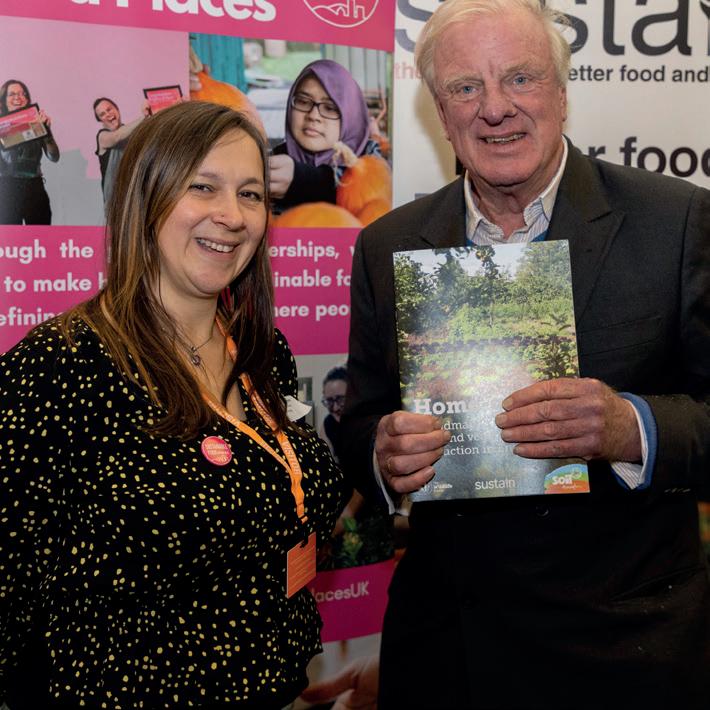
The Soil Association’s Sustainable Food Places Programme Manager, Leon Ballin said; We want the Government to seize the opportunity to adopt and fund Local Food Partnerships in every local authority and to support a Good Food Bill in each nation.
The event ended with a sense of hope and determination. Attendees were inspired by the stories of what food partnerships have already achieved and the potential for even greater change.
Sustainable Food Places are proof that when communities work together, they can create food systems that are fairer, healthier, and more sustainable.
Thanks
to Esmée
Fairbairn
Foundation for funding this vital work
Together, we’re able to continue transforming the food and farming landscape, making the planet a better place. The work we do has never been more important and we’re so grateful to have support to make this change happen.
Find out more: www.sustainablefoodplaces.org




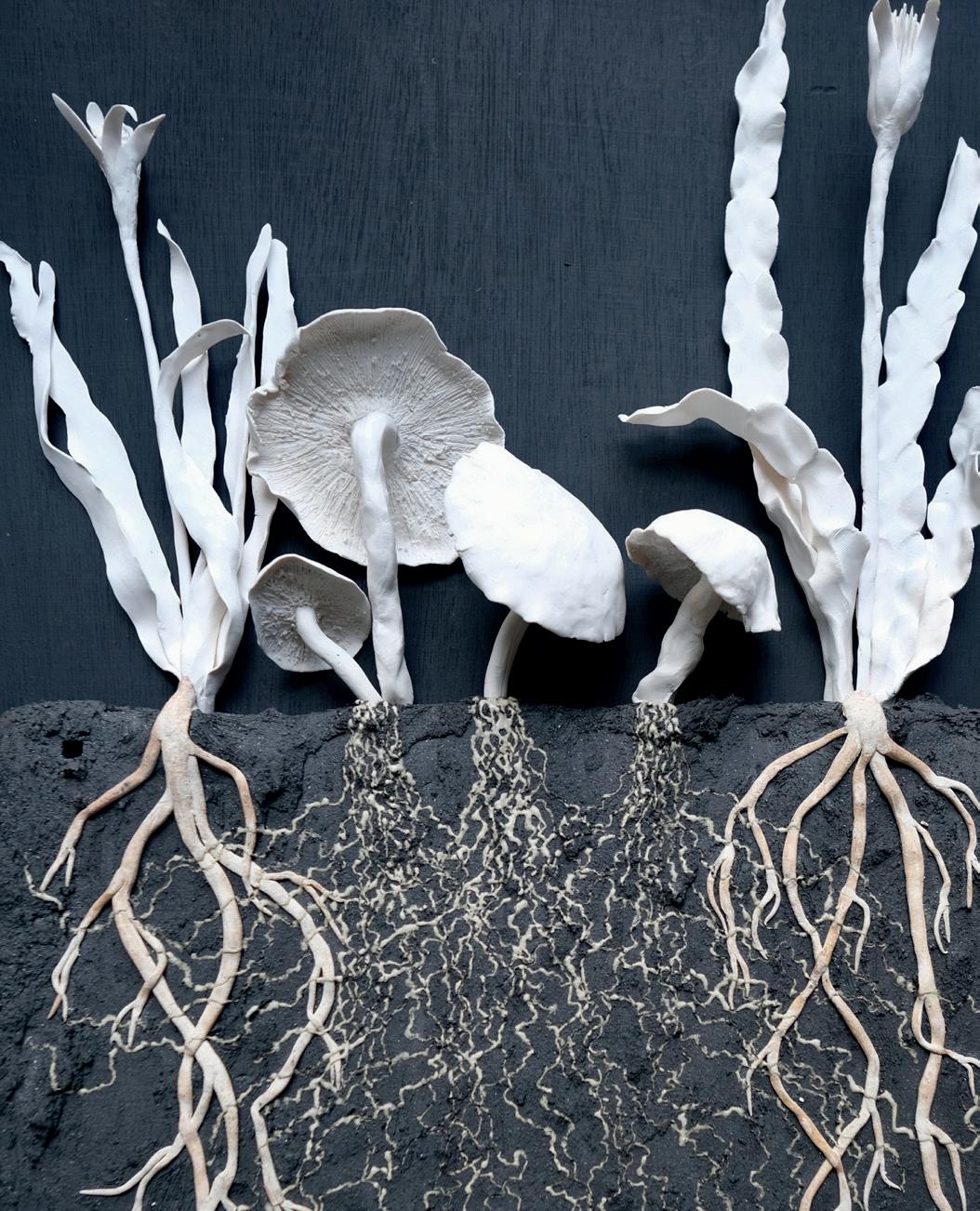
This groundbreaking exhibition unites visionary artists and thinkers from around the world to explore the remarkable power and potential of soil. Through a range of artworks, artefacts andinnovative approaches, visitors are invited to reconsider thecrucial role soil plays in our planet’s health. The show delivers amessage of hope and urgency, encouraging a more sustainable,harmonious relationship with the Earth—if we choose to act now. Book now at somersethouse.org.uk


Discover organic cleaning & laundry with Greenscents in 2025.
• Greenscents is the only Soil Association certified organic laundry & household range in the UK.
• 100% non-toxic formulas. Suitable for everyone including those with allergies & illness, babies, children & the elderly.
• 100% pet friendly. Read our blog about cleaning around our companion animals.
• 100% certified palm oil free, vegan & cruelty free.
• All Greenscents products are made in small batches in our workshops in Somerset.
greenscents.co.uk
FREE LAUNDRY LIQUID WITH YOUR FIRST ORDER when you add 500ml bottle of Laundry Liquid to your basket Quote code FRLL
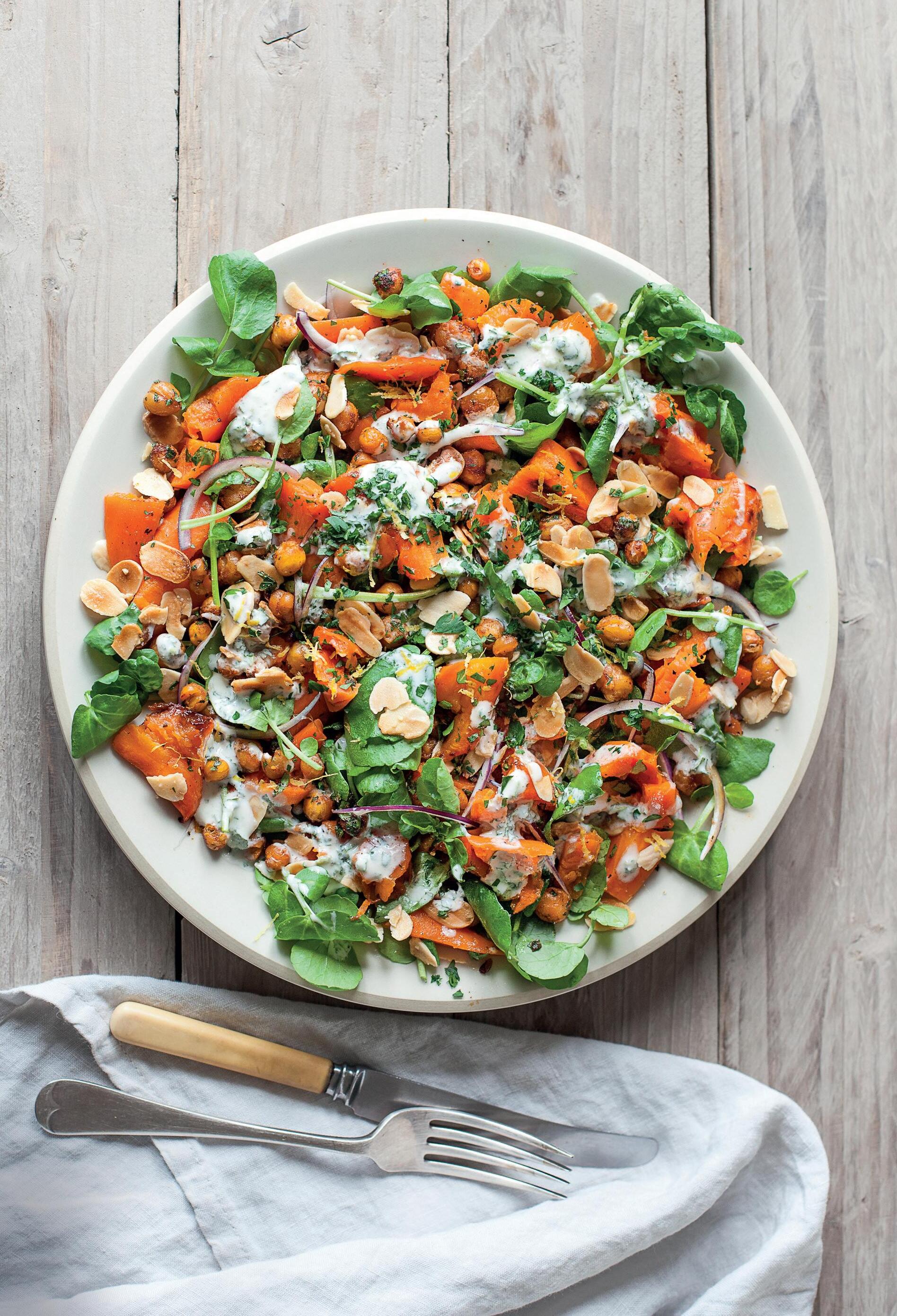
This hearty salad is packed with warming spice and flavour and will certainly liven up your seasonal carrots this winter!
Ingredients (serves 2)
• 40g flaked almonds
• 1 tin chickpeas
• Light olive oil
• 800g carrots
• 1 lemon
• ½ red onion
• 15g mint
• 30g parsley
Method:
1
Preheat oven to 200°C/Gas Mark 6. Toast the almonds on a roasting tray for 2-3 minutes until lightly golden in colour.
2 Drain the chickpeas and rinse under cold water. Tip into a clean tea towel and pat dry.
3 Remove the almonds and toss them with a dash of oil and a pinch of salt. Place the chickpeas in the roasting tray with 2 tablespoons of oil and season well with salt and pepper. Mix well and spread them out so they are one layer deep.
4 Peel and chop the carrots into bitesize pieces and zest and juice the lemon. Mix the carrots with half the lemon juice, 2 tablespoons of water and a generous coating of oil. Salt and pepper to taste. Place on a baking tray and tightly cover with foil.
5 Roast the carrots and chickpeas for 20 minutes, tossing the chickpeas occasionally, until they are golden brown.
• ½ garlic clove
• 50g watercress
• 1 tsp Dijon mustard
• 70ml kefir
• 2 tsp honey
• 1 tsp cumin
• 2 tsp smoked paprika
6 For the dressing, finely chop the garlic and mint. Whisk together the mustard, kefir and garlic, season with salt and pepper and stir in the mint.
7 Mix the honey into the carrots and return to the oven for 1015 minutes, until tender. Finely chop the parsley. Add the cumin, paprika and half the parsley to the chickpeas and mix well.
8 Finely slice the red onion and wash and dry the watercress.
9 Using a wooden spoon or potato masher, lightly smash the carrots into coarse pieces. Do this in the roasting tray so they can soak up the lemony oil.
10 Mix the carrots with the spiced chickpeas, red onion and watercress. Add the dressing and scatter over the almonds, remaining parsley and a little lemon zest to serve.

Soil Association Certification’s BOOM (Best of Organic Market) Awards are back—the UK’s only awards dedicated to celebrating the best in organic. This year, we’re shining a spotlight on the incredible people, businesses, and community organisations making organic affordable, accessible, and available to all through our brand new Best of Organic for All categories.
These inspiring categories are free to enter and include:
Nominate yourself, a local hero, a business, or a community organisation that embodies organic principles of health, ecology, care, and fairness. Entries close Monday 3rd February 2025 CELEBRATE ORGANIC EXCELLENCE WITH THE BOOM AWARDS 2025!

Join us in recognising those who are transforming the organic movement—visit our website for full details and entry criteria.
Be part of the organic celebration. Nominate today! soilassociation.co/nominate-BOOM
with Cows: The healing power of cows whilst navigating grief
David Mountjoy

In this book, the author David Mountjoy shares a personal, tragic yet inspiring story of how farming organically helped him accept the sad loss of his brother.
The book carries themes of organic farming, biodiversity, and the celebration of the natural world, and it explores how grief and personal difficulty can eventually be transformed into gratitude.
The inspiration for the story came from the suicide of the author’s beloved brother and the healing that Mountjoy explains he is fortunate to receive amidst a herd of cattle that he lives with in the French Pyrenees.
He describes his organic farm as a “hotspot of biodiversity” and tells the story of how tragedy can be overcome through the healing power of nature and “cowfulness”—mindfulness in the presence of cows.
Ultimately, “Being with Cows” is not just a memoir about farming; it is a meditation on the interconnectedness of life and a call to honour the relationships we cultivate with the creatures we share our world with.
If you’re enjoying our book recommendations, or would like to share any book ideas, please do get in touch! We’re always happy to hear from our readers, so please do share any books you’ve read that have changed the way you think about your food, farming or the natural world.
Email: memb@soilassociation.org
This is a summary of the Charity’s financial performance taken from the 2023/24 audited statutory accounts of The Soil Association Limited.
Full copies of The Soil Association Charity and Consolidated Group Annual Report and Financial Statements for the year ended 31st March 2024 are available on request from the Soil
Association or can be accessed on our website under ‘Who we are’ or on the websites of the Charity Commission and Companies House.
Income received by the Charity is classified as either unrestricted or restricted. Unrestricted funds are those that charity trustees may spend as they see fit in the delivery of the Charity’s
objectives. Restricted funds are those that must be spent as specified by the donor or grant funder.
Charitable giving from individual supporters through donations, legacies and memberships totalled £1,859k, a decrease of £273k on the prior financial year due to reduced legacy income, which is variable from one year to the next.
Restricted grant funding was £3,405k, up 3% on the prior year. The Charity runs and contributes to a significant number of funded programmes each year that deliver impact against our charitable objectives. In 2023/24 some of the largest were Innovative Farmers, Sustainable Food Places, Food For Life Scotland and Food For Life Get Togethers as well as Horizon Europe funded AI4SoilHealth, AgroecologyTRANSECT and NBSoil.
Income earned from providing contract and consultancy services into the public and private sectors was up 21% on the prior year at £1,328k. This income was from various sources, including local authority Food for Life commissions, fees from our Food for Life Served Here scheme, Farming contracts and ticket sales from our Agroforestry Show.
Income received from the Charity’s trading subsidiaries was £1,514k. Our organic and FSC Certification business paid a licence fee of £483k as well as donating its profit of £377k, which was a small increase on the previous year. SA Sales & Services Limited donated its profit of £654k, which was significantly higher than the prior year due to a high value corporate partnership secured in the last quarter and a year’s income invoiced up front.
The Charity’s expenditure in the year was reduced by a one-off £690k release of a long-standing creditor
balance. Excluding this, expenditure within the Charity was 6% lower than the prior financial year at £8,689k due to a reduction in Healthy & Sustainable Diets programmes spend as some significant funded programmes ended or moved into their final stages in the year. All other areas of expenditure increased year on year.
The Charity made an unrestricted surplus of £237k in the year, with unrestricted funds at 31st March 2024 increasing to £3,858k.
Group ‘free’ unrestricted reserves reduced slightly from £993k at the prior year end to £932k at 31st March 2024, which remains within the targeted range of free reserves set by Trustees. Our reserves are generated by and held for the benefit of the Soil Association Charity and two of its trading subsidiaries, most notably Soil Association Certification, a £12m business. ‘Free’ reserves are the amounts readily available to support the Group in the event of unexpected reductions in income or cost increases and to provide a source of funds for planned investment in future years.
The balance of unrestricted reserves of £2,926k represents assets required for ongoing operations, including principally our Head Office building, as well as amounts we must hold as a condition of our mortgage borrowing and some corporate partnership funds which are ringfenced for specific programme work.
A restricted deficit of £79k was made in the year with expenditure on delivering restricted programmes slightly exceeding income received for this purpose. The restricted funding balance of £2,321k carried forward at 31st March 2024 comprises grant income that will fund expenditure on programmes in future years, as agreed with the grant funders.
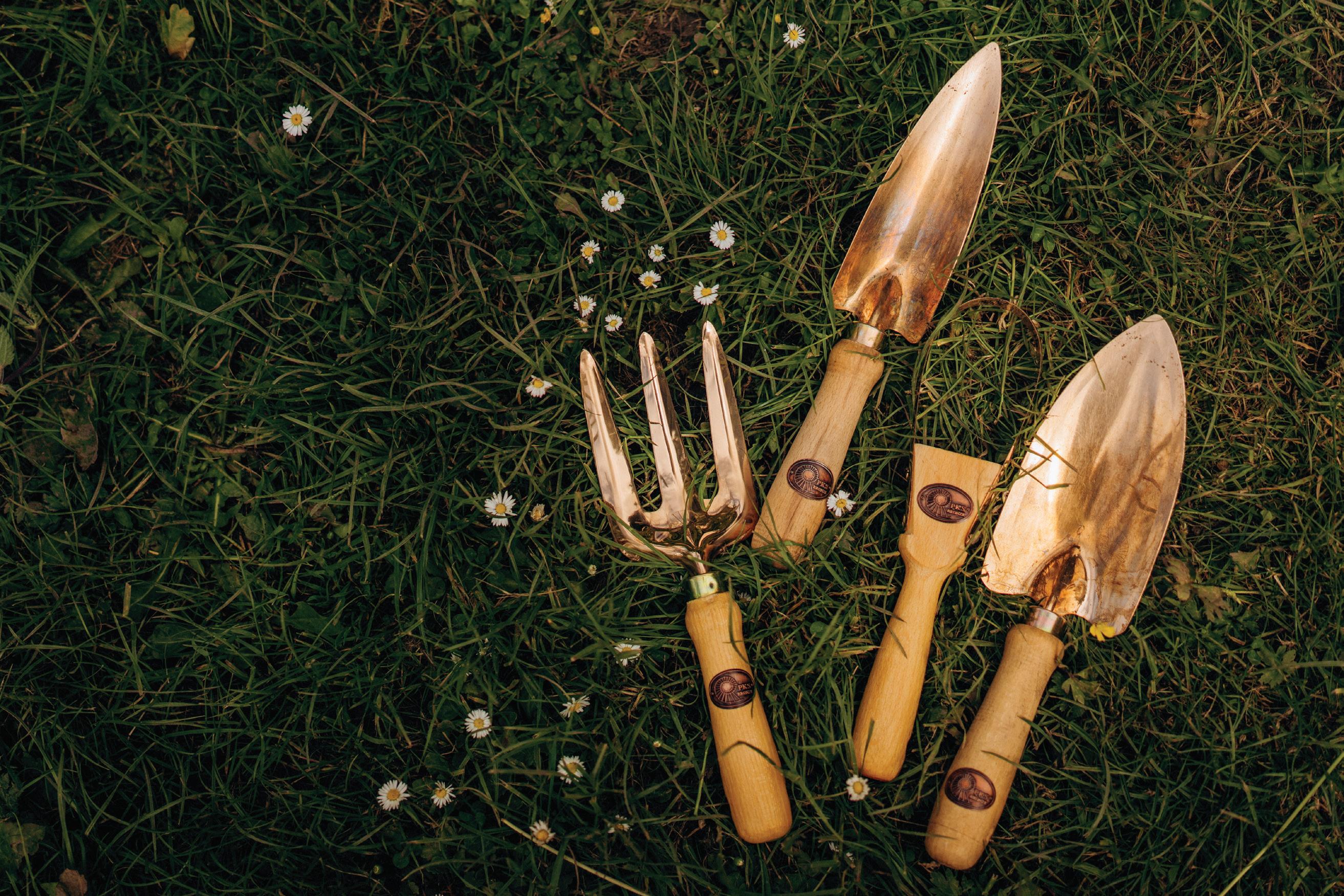






Simply sprinkle for an instant Japanese umami twist
Rice | Grill | Noodles

SAVOURY FURIKAKE
“Vibrant shiso zing with an earthy umami finish”

Book a viewing now:
W: www.ethicalproperty.co.uk/ office-space/bristol/streamline
T: 0117 916 6459














